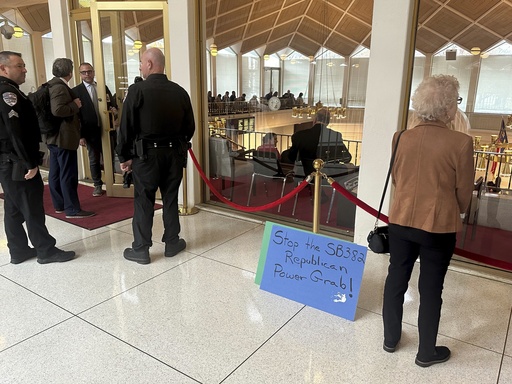RALEIGH, N.C. — On Wednesday, Republican legislators in North Carolina passed a comprehensive bill aimed at diminishing the authority of the incoming governor and other Democratic officials in the state, which ranks as the ninth largest in the U.S. The legislation, sprawling over 131 pages, includes provisions for relief from Hurricane Helene, and it was hastily approved during a lame-duck session of the General Assembly.
The Senate’s approval, which followed strict party lines, includes significant changes to the State Board of Elections, likely tilting the composition towards a Republican majority, currently controlled by Democrats. Additionally, the bill proposes earlier deadlines for post-election processes in 2025, addressing concerns raised by Republicans who felt that counties took an excessive amount of time to tally provisional and absentee ballots during a tightly contested Supreme Court race.
The House had previously endorsed the same measure on Tuesday, and it is now set to be presented to outgoing Democratic Governor Roy Cooper, who has strongly criticized the initiative as a “massive power grab.” Other members of the Democratic Party have argued that some aspects of the bill may be unconstitutional, with any attempts to override a veto expected to take place early next month.
Formulated in the final weeks of the legislative session when Republicans hold a veto-proof majority—a status that may soon change following recent electoral losses—the bill was approved less than a day after its public release.
As Cooper prepares to depart office by the year’s end, he will hand over the reins to another Democrat, Josh Stein, who is likely to be able to thwart Republican initiatives if party members remain unified. This sets the stage for Republicans to push through such partisan legislation one last time while they still hold the majority.
During this fall legislative session, lawmakers had already achieved near-unanimous consensus on allocating over $900 million for relief and recovery efforts following Hurricane Helene. Cooper has requested additional funding—at least $3.9 billion—expressing urgency in the matter. While this week’s bill provides an extra $252 million from state reserves for disaster recovery, the majority of this amount will not be immediately accessible.
Senator Lisa Grafstein of Wake County criticized the bill, stating, “True power would have empowered the residents of western North Carolina to rebuild.” She described the legislation as a regrettable exhibition of governance, lacking the emotional capacity for healthy democratic engagement.
The bill also represents yet another attempt by Republicans to reclaim control of State Board of Elections appointments, a power historically held by the governor. Prior attempts have faced legal challenges, including a 2023 law that sought to transfer appointment authority from the governor to the legislature.
If this new bill is enacted, the state auditor will gain appointment powers, a position that will soon be held by Republic Dave Boliek, who was just elected. This shift is likely to result in Republican dominance on the elections board, affecting election governance at the county level as well.
Republicans argue that these amendments are intended to expedite election results and improve efficiency. Senator Ralph Hise of Mitchell County stated, “The aim of these changes is to ensure a quicker resolution of election results rather than prolonging the process for two weeks, as demonstrated in the latest elections.”
Concerns have been raised about the unprecedented nature of granting election oversight to the state auditor, a position not found in other states. David Becker, a former U.S. Justice Department lawyer, has called the bill “deeply troubling,” suggesting that it may negatively impact voter access and could lead to legitimate ballots being discarded.
The legislation also aims to limit the governor’s ability to fill vacancies on the state Court of Appeals and Supreme Court, restricting selections to candidates put forth by the outgoing judge’s political party. Additionally, the bill would impose limitations on the new attorney general by preventing him from opposing the General Assembly in legal challenges regarding the legitimacy of laws, particularly in light of Stein’s recent refusal to defend certain abortion restrictions.
The bill further restricts the incoming superintendent of public instruction, Mo Green, from appealing decisions made by a state board that assesses charter school applications.
Opponents of the bill gathered to observe the Senate discussion but were met with controversy when applause broke out for a Democratic senator’s remarks. This prompted the GOP Lt. Governor and presider, Mark Robinson, to clear the gallery, labeling attendees as “immature people.” No arrests were recorded during this incident.
The passage of this legislation echoes events from late 2016, when Republicans similarly diminished the governor’s powers just before Cooper was to assume office following Republican Pat McCrory. That earlier move triggered public protests, law enforcement actions, and subsequent legal battles.


